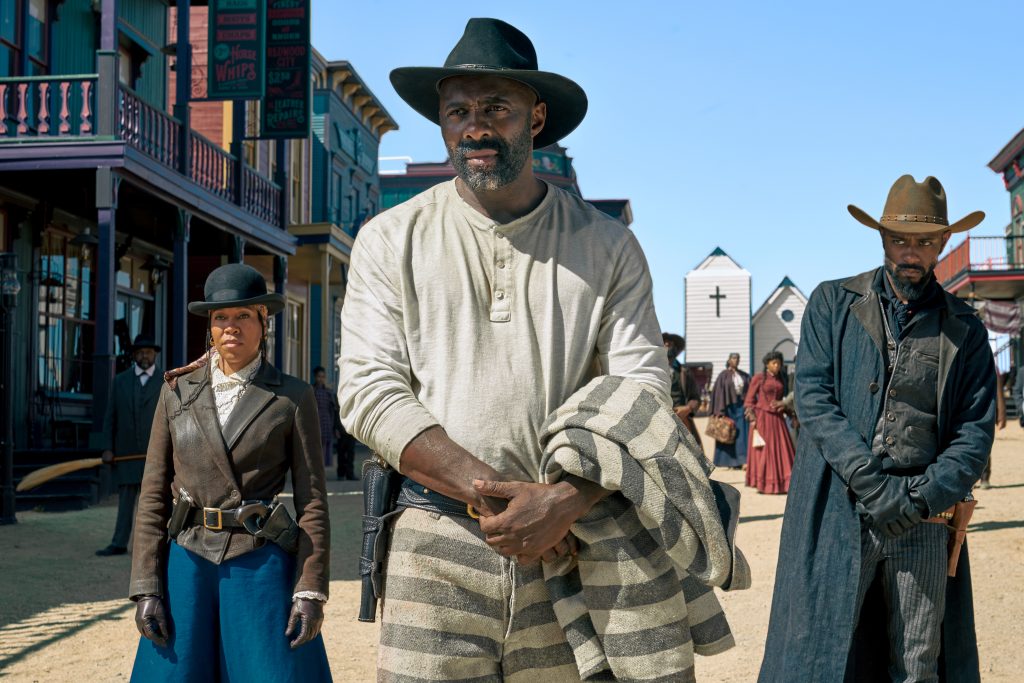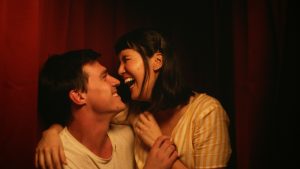December 4, 2021
by Carla Hay

Directed by Jeymes Samuel
Culture Representation: Taking place in Texas in the mid-1880s, the Western action drama “The Harder They Fall” has a predominantly black cast of characters (with some white people, Latinos and Native Americans) representing the working-class, middle-class, wealthy and the criminal underground.
Culture Clash: When cowboy Nat Love finds out that his arch-enemy Rufus Buck has escaped from prison, Nat assembles a posse that battles against Rufus’ gang.
Culture Audience: “The Harder They Fall” will appeal primarily to people who are interested in well-acted, action-oriented Western dramas about the underrepresented African American cowboy culture of the 1880s, but viewers of the movie should have a high tolerance for over-the-top violence.

With grisly violence that is almost cartoonish, “The Harder They Fall” puts a well-acted spotlight on real-life African American cowboys of the 1880s. The movie’s excessive violence might be a turnoff to some viewers. But for viewers who can tolerate all the blood and gore, “The Harder They Fall” is a bumpy and thrilling ride with a top-notch cast.
“The Harder They Fall” is the second feature film of director Jeymes Samuel, who co-wrote “The Harder They Fall” screenplay with Boaz Yakin. Samuel, also composed the movie’s score, has said in interviews that the title of the movie was inspired by the 1972 movie “The Harder They Come,” starring reggae singer Jimmy Cliff—not the 1956 Humphrey Bogart/Rod Steiger movie “The Harder They Fall.” Samuel is a British filmmaker (he’s the younger brother of pop star Seal) who grew up adoring Western movies. However, Samuel eventually found out that these Westerns often gave inaccurate demographic depictions of what post-Civil War life was like the Old West of the 19th century.
In reality, people of color and women had much more agency and independence in Old West culture than what’s shown in most old-time Western movies, which usually portray only white men as leaders of cowboy posses. “The Harder They Fall” aims to course-correct these historical exclusions by doing a fictional portrayal of real-life African American posse members from the 19th century. In case it wasn’t clear enough, a caption in the movie’s introduction states in big and bold letters: “While the events are fictional, the people are real.” (At least the movie’s main characters are based on real people.)
“The Harder They Fall” also doesn’t sugarcoat the reality that there were good and bad cowboy posses. Black people are no exception. The African Americans in the movie are not portrayed as subservient stereotypes, but they aren’t exactly saintly either. Most are just trying to get by and live good lives, while there are some hardened criminals who create chaos for people who have the misfortune of crossing their paths. “The Harder They Fall” takes place in various parts of Texas, but the movie was actually filmed in New Mexico.
“The Harder They Fall” opens with a 10-year-old boy named Nat Love (played by Chase Dillon) witnessing the brutal murder of his parents—Reverend Love (played by Michael Beach) and wife Eleanor Love (played by DeWanda Wise)—during a home invasion. The gangsters shoot Nat’s parents, but they spare Nat’s life. The leader of this gang uses a knife to carve a cross on Nat’s forehead.
About 20 years later, Nat (played by Jonathan Majors) still has the scar on his forehead. And he’s had a lifelong obsession with getting revenge on the gangsters who killed his parents. Nat knows that Rufus Buck (played by Idris Elba) is the gang leader who is the main culprit for the murders. Rufus has recently been in prison for armed robbery and murder.
However, Nat finds out that Rufus has made a prison escape. Two of Rufus’ loyal cronies—ruthless Trudy Smith (played by Regina King) and smooth-talking Cherokee Bill (played by LaKeith Stanfield)—have hijacked the train where prisoner Rufus was being transported, and they broke Rufus out of the cell where he was being kept.
After Nat discovers that Rufus is now a free man (but still wanted by law enforcement), Nat assembles his own posse to get revenge. The other members of the Nat Love Gang are Mary Fields (played by Zazie Beetz), who is Nat’s feisty love interest; Bill Pickett (played by Edi Gathegi), who is a loyal and logical; Jim Beckwourth (played by RJ Cyler), who is a cocky young cowboy; and Cuffee (played by Danielle Deadwyler), who lives as a transgender man.
Nat makes a living by finding “wanted dead or alive” criminals for reward money. Nat has no qualms about killing these criminals if he thinks they deserve it. That’s what happens in an early scene in the movie when Nat shoots and kills a wanted criminal who shows up at a Catholic church with the intention of robbing the church. Nat’s reward is $5,000.
It turns out that Nat and his gang are outlaws too, because they make money by stealing from robbers. Therefore, one of their least-favorite people is Bass Reeves (played by Delroy Lindo), a U.S. marshal who’s determined to put a stop to all this criminal activity. In addition to seeking revenge on Rufus, the Nat Love Gang also wants to avoid capture by Reeves and his law enforcement team. The posse members on both sides are also mistrustful of Wiley Esco (played by Deon Cole), the Redwood City mayor whose allegiances can be murky.
It should be noted that in real life, Bass Reeves is the inspiration for the Lone Ranger character, which has been played by white actors in movies and television. Reeves was considered a pioneer for African Americans in law enforcement, because he did a lot to change American viewpoints that white people aren’t the only race who can become U.S. marshals. In real life, Reeves worked closely with Native American leaders. It’s an alliance that’s depicted in the movie too.
In many ways, “The Harder They Fall” follows a lot of the traditions of typical Westerns, with gun shootouts and chases on horseback. There’s also some romance, as Mary and Nat have an on-again, off-again relationship. Mary, who works as a saloon singer, has a hard time trusting Nat because he’s cheated on her in the past. Nat is an emotionally wounded rebel who’s trying to win back Mary’s heart, but first he has to learn how to heal his own broken heart.
And there’s inevitable fighting among posse members. Most of the friction in Nat’s gang comes from Jim and Bill having personality clashes with each other. Bill thinks Jim is arrogant and reckless, while Jim thinks that Bill is uptight and too cautious. It’s the classic older cowboy/younger cowboy conflict that’s often seen in Westerns.
There are also some gender issues with Cuffee, who wants to live life as a man, but some people think that Cuffee is a woman just doing a drag act. There are parts of the movie where people aren’t sure whether to call Cuffee a “he” or a “she,” since the word “transgender” did not exist at the time. And when Cuffee has to wear a dress (for reasons what won’t be revealed in this review), it makes Cuffee very uncomfortable. After seeing Cuffee in a dress, Jim blurts out that he now knows why was kind of attracted to Cuffee.
Damon Wayans Jr. has a small role in the movie as Monroe Grimes, someone who is captured by Nat’s posse members to get information about Rufus. As for Rufus, he’s a cold-blooded killer who has enough of a twinkle in his eye and swagger in his walk to indicate why his posse subordinates find him so magnetic. Mary can give Rufus a run for his money, in terms of being fearless in battle. Cherokee Bill is violent too, but he’s more likely to use psychology to try to outwit an opponent.
“The Harder They Fall” isn’t particularly innovative in the story structure and dialogue, but there are some impressive camera shots from cinematographer Mihai Malaimare Jr., and the movie delivers when it comes to adrenaline-filled action scenes. A standout camera shot is in a scene where the camera zooms in with a bullet-like trajectory at a group of posse members to then reveal that there are others standing behind them. Also adding to the striking visuals of “The Harder They Fall” is the first-rate costume design by Antoinette Messam, who brought a practical yet fashionable look to many of these Old West characters.
All of the actors perform well in their roles, with the best scene-stealing moments coming from Majors, King, Elba, Beetz, Stanfield and Deadwyler. Where the movie falters a bit is in how it abandons its mostly gritty realism for some stunts that are so heavily choreographed, it takes you out of the realism and just becomes a reminder that this movie’s fight scenes can sometimes look like ultra-violent parodies of fight scenes in Westerns.
What doesn’t come across as a parody is how credibly the cast members portray their characters. These engaging characters bring real heart and soul to “The Harder They Fall.” (There’s also a poignant plot twist/reveal at the end of the movie that might or might not be surprising to some viewers.) Even though not everyone makes it out alive by the end of the movie, it’s clear by the movie’s last shot that there’s room for a sequel for a spinoff.
Netflix released “The Harder They Fall” in select U.S. cinemas on October 22, 2021. The movie’s Netflix premiere was on November 3, 2021.




